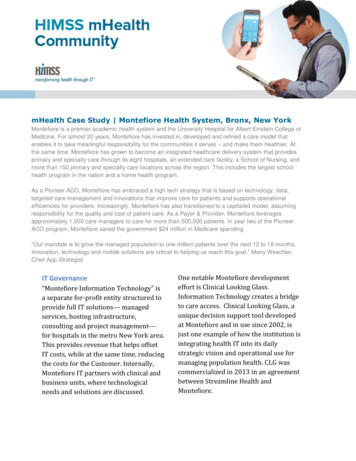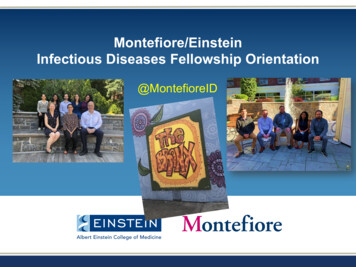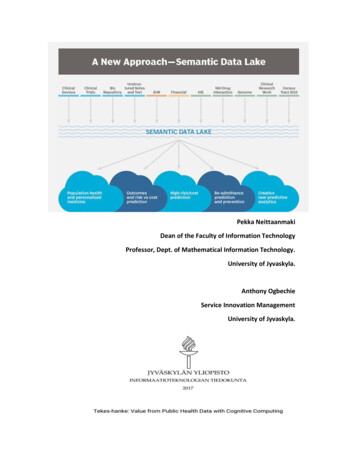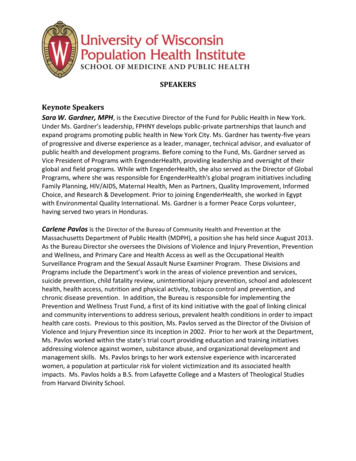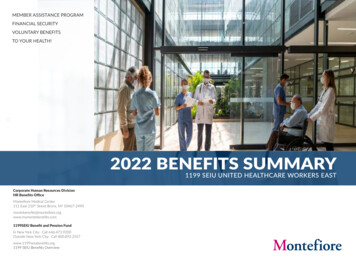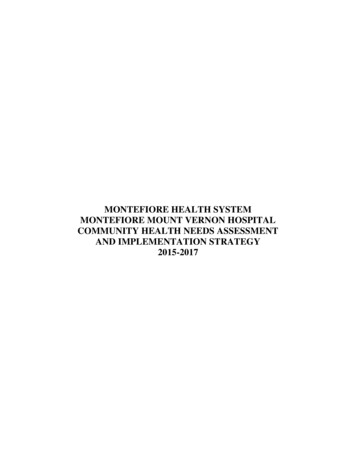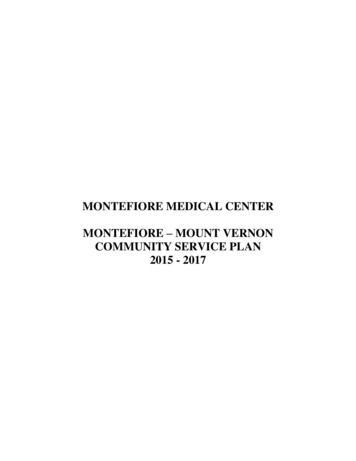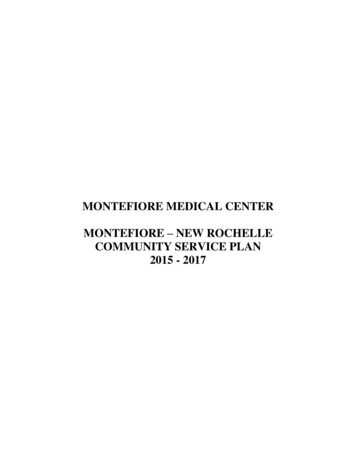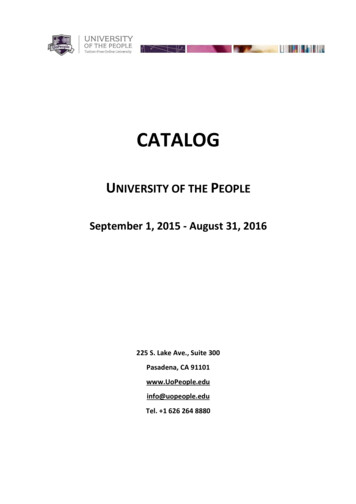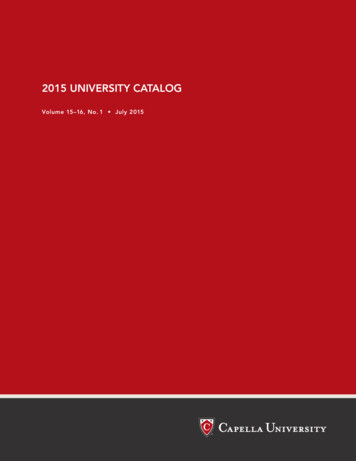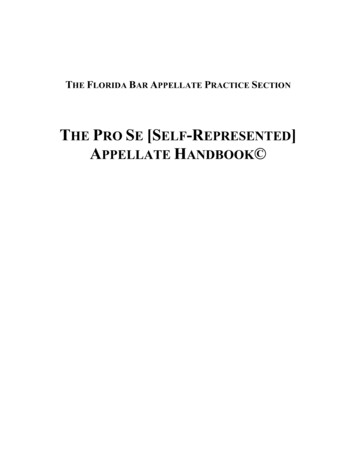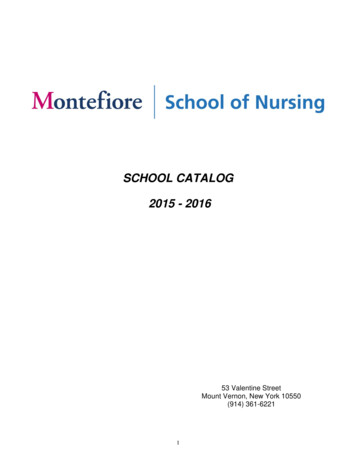
Transcription
SCHOOL CATALOG2015 - 201653 Valentine StreetMount Vernon, New York 10550(914) 361-62211
MONTEFIORE SCHOOL OF NURSINGAffiliated with Mercy College, Dobbs Ferry, New YorkA single-purpose institution offering an Associate in Science Degree (in Nursing)Registered by:The New York State Education Department - Hegis Code 5208.20Office of College and University Evaluation5 North Mezzanine, Albany, NY 12234Telephone: 518: 474-2593Accredited by:Accreditation Commission for Education in Nursing, Inc.3343 Peachtree Road NE, Suite 850, Atlanta, Georgia 30326(404) 975-5000Member of:Council of Independent Colleges and UniversitiesNew York State Associate Degree Nursing CouncilNew York State Council of Hospital Schools of Professional NursingArticulation Agreements for BS:Graduates can transfer credits accrued at Montefiore School of Nursing toward a Bachelor ofScience Degree (in nursing). Articulation agreements are maintained with:Chamberlain CollegeCollege of New RochelleDominican CollegeExcelsior CollegeMercy CollegeSUNY Delhi CollegeSUNY Empire State CollegeMontefiore New Rochelle Hospital is the parent organization for the Montefiore School ofNursing.Montefiore School of Nursingoffers equal opportunity to all qualified applicantsregardless of race, color, sex, ancestry, national origin,religion, age, marital status, sexual orientation, or disability.2
TABLE OF CONTENTSGeneral Information4Admission Policies12Financial Information20Curriculum23Academic Policies33Student Facilities and Services44Safety and Security47Staff Listing50Travel Directions51Index52The school reserves the right to change, without advance notice, any rules governingcurriculum fees, administration, admissions, regulations affecting students, dates andcourse content, and other issues, as deemed necessary for the continued developmentof the school.3
MONTEFIORE SCHOOL OF NURSINGGENERAL INFORMATIONThe Montefiore School of Nursing is located in a suburban community adjacent to Bronx Countyof New York City, and Yonkers, New Rochelle and Pelham in Westchester County. The schoolis affiliated with Mercy College located nearby in Dobbs Ferry. The college provides instructionin the Liberal Arts and Science courses.The Montefiore School of Nursing offers a two-year program leading to an Associate in ScienceDegree (in Nursing). Students can enter the Fall Semester for day program or the Springsemester for evening/weekend program. The evening/weekend program operates onweeknights and Saturdays.Since 1884, Montefiore has cared for the chronically ill and has made it a priority to improve thequality of life for underserved populations. This founding belief is the cornerstone of ourmission, vision and values. Over the ensuing 125 years, Montefiore has grown into a 1490 bedhealthcare delivery system that treats over 90,000 inpatients and over 300,000 emergency roomvisitors per year. Forty percent of the patients admitted at Montefiore are Medicare patients,another thirty five percent are on Medicaid.Montefiore’s mission is rooted in our enduring commitment to provide high-quality care to allpatients - regardless of their backgrounds or health insurance. Our unique care delivery modelcombines innovation, dedication and academic and community partnerships. Montefiore’s fourpart mission - to heal, to teach, to discover and to advance the health of the communities weserve - works because of our commitment to integrated clinical care and community service.We seek to educate the next generation of caregivers and create new knowledge throughtranslational research. Montefiore is distinguished by its commitment to community service incombination with the clinical, teaching and research mission elements characteristic of leadingacademic medical centers.To truly transform health at the community, regional and national levels, we must establishourselves as a premier academic medical center and commit to raising Montefiore’sperformance and its ranking relative to other leading medical centers. Our partnership withAlbert Einstein College of Medicine is essential to becoming an academic medical center that isa national destination.The Montefiore School of Nursing is yet another key piece of the healthcare delivery system.The Montefiore School of Nursing will play an essential role in training future caregivers,particularly those from our community of the Bronx and Westchester Counties.MONTEFIORE SCHOOL OF NURSING MISSION STATEMENTAs a student of Montefiore School of Nursing, we ask you to seriously review the mission andphilosophical statements of the hospital and school, and subscribe to them as the focal points ofyour dreams and aspirations.Montefiore School of Nursing’s mission statement and philosophy are congruent with themission statement and philosophy of its parent institution. For that reason, we ask you to reflectupon their meaning as you embark upon your career in nursing.4
MONTEFIORE SCHOOL OF NURSINGVISIONThe School of Nursing will exemplify Excellence in Nursing Education.MISSIONThe mission of the School of Nursing is to provide a quality education in the art and science ofnursing through collaborative efforts with the Montefiore Medical Center. Our graduate will be acaring, competent, compassionate nurse prepared to meet the health and wellness needs ofmulticultural communities.PHILOSOPHYThe philosophy of the School of Nursing embraces a caring healing framework rooted inWatson’s Theory on Caring. We believe that individuals strive for a harmonious balance ofmind, body and spirit. Caring promotes the notion that every human being strives forinterconnectedness with other humans and nature. It is comprised of three basic tenets:Altruism, Empathy and Compassion.Our curriculum centers on interactions and transactions that occur between and among facultyand students with the intention that learning takes place. The curriculum embraces theprinciples of a caring healing framework.The faculty believes that the generation and transmission of nursing knowledge is bestaccomplished through the teaching-learning process. This process is the responsibility of bothfaculty and student.Throughout the curriculum modeling, dialogue, practice and confirmation are utilized to enhancelearning experiences. The Domains of Learning are linked to the Caring Healing Framework inthe following manner:Altruism -------- PsychomotorEmpathy ------- CognitiveCompassion --- AffectiveMutually the faculty and students create learning experiences that encompass self-care,colleague care, client/family care and community care.5
Our philosophy incorporates the following definitions:Human BeingsHuman beings are open systems in regard to the spiritual-mental-physical world andhave the capacity for growth, fulfillment and change. Each human being is viewed as greaterthan and different from the sum of his/her parts.HealthHealth is the unity and harmony within the mind, body and spirit. It is associated with thedegree of congruence between the self as perceived and the self as experienced.NursingNursing implements the carative factors of compassion, empathy and altruism with theintention of healing body, mind and spirit. The interconnection of caring and healing areprimarily exemplified in the nurse-client relationship in which the nurse and the client care andheal in unison.AltruismAltruism is defined as the act of performing interventions to promote health and to relievethe suffering of others without regard to race, color, religion, sexual preference.EmpathyEmpathy is the understanding of another’s suffering in the context of an interpersonalrelationship.CompassionCompassion is the sharing of another’s suffering in the context of an inter-personalrelationship.Associate Degree GraduateThe Associate Degree can be a terminal degree or a transitional step to BaccalaureateEducation or higher. The graduate is able to integrate knowledge and adapt to change in bothinstitutional and community settings. The graduate applies critical thinking skills and clinicalcompetencies within the framework of the nursing process and ethical-legal standards asdefined by the Nurse-Practice Act.6
CURRICULUM THEORYThe curriculum is based upon the following theory:Watson’s Theory on CaringCURRICULUM THREADSI. Professionalism/Role Developmenta. Legalb. Ethicalc. Professional Organizationsd. Continuing Educatione. Impaired Practicef. Researchg. Political ActionII. Nursing Process (Assess/Analyze, Plan, Implement, Evaluate)a. Critical Thinkingb. Safetyc. Health Promotion and Maintenanced. Teaching/Educatione. Management of CareIII. Communicationa. Oralb. Writtenc. ElectronicIV. Psychosocial Integritya. Multiculturalismb. End of Life/Palliative Carec. Abuse and Neglectd. Stress Managemente. Mental Health ConceptsI. Physiological Integritya. Complimentary Therapiesb. Traditional Therapiesc. Management of Disease Processes7
CURRICULUM AND COURSE OUTCOMESThe curriculum and course outcomes reflect the essential core competency components identified for AssociateDegree Nursing Education; including: Professional Behaviors; Communication; Assessment; Clinical Decisionmaking; Care Interventions; Teaching and Education; Collaboration and Managing Care.Montefiore School of Nursing utilizes two levels of achievement: First Year that reflects the nursing courses of N1and N2 and Second Year that reflects the nursing courses of N3 and N4.FIRST YEARCURRICULUM OUTCOMESDemonstrate effective communication anddocumentation in addressing client healthneeds at various stages along thecontinuum of the life cycleNURSING 1Apply principles of basic therapeuticcommunication skills in interactions with clients,family and members of the health care team. Recognizes barriers tocommunication Anticipates barriers to verbal andnon-verbal communicationApply critical thinking skills in assessing,planning, implementing and evaluating thedelivery of care to clients.Demonstrate an understanding of each phaseof the nursing process, applying the theories ofWatson, Erikson and Maslow. Identifies client problems according toNANDA terminology Identifies realistic short and longterm goals Separates nursing goals form clientgoals Adheres to the plan of care Determines client’s response toproceduresUtilize appropriate teaching/learningstrategies in collaboration with members ofthe health care team for clients andsignificant others, emphasizing healthpromotion and the prevention of illness.Incorporate the concepts of holism andculturally sensitive care when addressingfactors impacting clients’ state of wellnessacross the health care continuum. Recognizes principles of physical andsocial sciences in identifying clientneeds Identifies client teaching needs. Formulates short-term realisticteaching goals Performs procedures correctly Implements individualized teachingplans. Documents teaching and learningDemonstrate a caring, compassionate andnurturing approach for clients of varioussocial and ethnic backgrounds in varioushealth care settings.Demonstrate the use of caring behaviors inassisting the client to meet basic needs throughthe use of traditional and complimentarytherapies. Identifies patient safety/comfortmeasures Identifies the emotional and physicalneeds and responses of the clientProvide safe and effective nursing care in avariety of settings. Identifies ethical/legal responsibilitiesrelated to client care Communicates ethical/legal conflictswith instructor Reports client care problems Shares information at pre/postconferencesPractice within the framework of the NursePractice Act8NURSING 2Clearly communicate thoughts and actions inoral, written and technological formats for thepurpose of client care and education. Identifies verbal and non-verbalcommunication techniques essentialto the nurse-client relationship Reports significant changes inclient’s status promptly Evaluates the effectiveness of 1:1communicationUtilize critical thinking skills in all steps of thenursing process for hospital based clients,using as a basis for decision making thetheories of Watson, Erikson and Maslow. Identifies actual and potentialnursing diagnoses in order of priority Identifies priorities for individuals andgroups of clients Verbalizes principles of proceduresto instructor Includes scientific principles whenplanning care. Implements a plan of care utilizingscientific and behavioral principlesDemonstrate knowledge of psychosocialintegrity by appropriate application of principlesto client care, incorporating principles oftherapeutic communication and cultural care toall interactions. Assesses client’s readiness,motivation and barriers to effectiveeducation Utilizes principles of learning andteaching when developing the planof instruction Develops an education plan for aclient based on individualized needs Documents teaching and learning Evaluates the effectiveness ofteachingDemonstrate knowledge of psychosocialintegrity by appropriate application of principlesto client care, focusing on knowledge gained. Establishes rapport by conveyingacceptance and understanding Individualizes the procedure to theclient’s needsIntegrate complementary therapy into safe,effective nursing care for clients in a variety ofsettings. Reviews standardized procedures Differentiates the role of the nursefrom those of other health careworkers Identifies ethical/legal problems inthe plan of care Relates the nursing plan of care tothe plan of care of other health careworkers Works within the policies of theeducational/health care setting
Assume self-direction for ongoing learningand professional development.Apply principles of beginning professionalbehaviors in accordance with the role of theAssociate Degree nurse in the health caresetting. Recognizes limitations and seeksappropriate assistance Communicates nursing plan of careto other heath care workers Evaluates effectiveness of nursingactionsModel professional behaviors whileincorporating role development into actions Evaluates own role as a member ofthe health care teamSECOND YEARCURRICULUM OUTCOMESDemonstrate effective communication anddocumentation in addressing client healthneeds at variousNURSING 3Establish a therapeutic relationship betweenindividuals, their significant others and thecommunity to promote a harmonious balancebetween mind, body and spirit. Recognizes communicationtechniques applicable to groups Formulates strategies forcommunicating with clients, familiesand groups Clarifies one’s own communicationtechniques based on feed back fromclients and others Modifies communication techniquesbased on client responses Initiates referrals to communityresourcesNURSING 4Utilize appropriate communication skills inaddressing the needs of the family Utilizes appropriate communicationskills in addressing the needs of thefamily Evaluates and modifiescommunication techniquesapplicable to groups Formulates and modifies strategiesfor communicating with clients,families and groups Collaborates with health careworkers in multi-disciplinarymeetings Communicates effectively to adiversified populationApply critical thinking skills in assessing,planning, implementing and evaluatingthe delivery of care to clients.Utilize critical thinking abilities in the delivery ofcare to clients, their significant others and thecommunity/society through the synthesis ofnursing knowledge based upon the theories ofWatson, Erikson and Maslow. Relates physical assessment andother data to specific nursingdiagnosis Identifies independent nursing actions Formulates a plan of care based onnursing diagnosis Formulates nursing orders Compares the client’s responses todifferent interventions and documentsaccurately utilizing DAR and systemsassessment methods of charting Adapts the plan of care to includecomplimentary methods of care Evaluates nursing interventions foroutcome achievement of the clientDescribe the major impact of theorists:Maslow, Erikson and Watson on thechildbearing and childrearing family. Identifies patterns of behavior thatinterfere with learning across thelifespan Acknowledges similarities anddifferences in nursing care amongage groups Alters the approach to the individualclient in accordance with theirparticular stage of development Delivers care specific to client’s levelof developmentUtilize appropriate teaching/learningstrategies in collaboration with membersof the health care team for clients andsignificant others, emphasizing healthpromotion and the prevention of illness.Demonstrate the ability to integrate holisticstrategies and therapeutic interventions tomaximize the curative capabilities of individuals,their significant others and the community within culturally diverse populations in collaborationwith the health care team. Identifies patterns of behavior thatinterfere with learning across the lifespan Prioritizes learning needs Alters the approach to the client inaccordance with their individual stageof development Seeks and coordinates input fromother heath team members for theplan of care Selects appropriate method ofinstruction and teaches to clients andgroups Modifies the teaching plan to reacheducational goals Differentiates the scope ofresponsibility of each disciplineImplement cultural and caring strategies ofhealth promotion, health protection andprevention of illness. Correlates data systematically inidentifying clients needs Selects appropriate methods ofinstruction and adapts according todevelopmental age Practices advocacy based onprinciples of respect for humandignity and support of client’s rights Assists the clients and family toaccept realistic limitations imposedby illness9
Demonstrate a caring, compassionateand nurturing approach for clients ofvarious social and ethnic backgrounds invarious health care settings.Practice within the framework of theNurse Practice ActAssume self-direction for ongoing learningand professional development.Effectively integrate client’s cultural attitudes,values and beliefs in a plan of care whichexemplifies the nurse-client relationship Practices advocacy based onprinciples of respect for human dignityand support of client’s rights Assists the client and family to acceptrealistic limitations imposed by illness Prioritizes nursing care based onclient’s needs, values and beliefs Adapts/integrates plan of care basedupon cultural practices and influencesfor diverse populations Alters the approach to the individualclient in accordance with their culturalbackgroundPractice nursing in a holistic, competent mannerwith individuals, families, communities andsociety. Recognizes nursing limitations withinthe professional ethical and legalframework. Recognizes nursing limitations withinthe standards of nursing practice andcode of ethics Formulates a plan of care within thestandards of nursing practice andcode of ethics Practices within the standards ofnursing practice and code of ethics Identifies responsibilities andaccountability for nursing judgmentsand actionsDemonstrate progression toward professionalbehavior consistent with the role of theAssociate Degree graduate in the health caredelivery system Implements independent nursingactions based on professionaljudgment for a select group of clients. Seeks opportunities for professionaldevelopment Evaluates self progress towards thedevelopment of personal professionalgrowth and behavior10Demonstrate mastery of the nursing processand critical thinking skills in the delivery of careto a specialized population Evaluates the plan of care andmodifies the plan based on changesidentified in nursing diagnoses Revises plan of care based on clientresponses Documents accurately on chart usingthe DAR and PIE approach Evaluates the plan of care based onclient’s developmental age andcultural practicesEvaluate safe and effective nursing care to avariety of clients across the life span Delivers nursing care based onobjective Evaluates and adapts priorities ofnursing care based on client needs Performs standardized proceduresindependently Adapts the plan to includecomplimentary methods of care Correlates data systematically inidentifying client needs across thelifespanDemonstrate professional behavior consistentwith the role of the Associate Degree inNursing graduate. Recognizes nursing limitations withinthe professional ethical and legalframework for clients across thelifespan Practices within the standards ofnursing practice and code of ethicsfor clients in a variety of settingsacross the lifespan Implements independent nursingactions based on professionaljudgment Develops a plan for professionaldevelopment Evaluates responsibility andaccountability for nursing judgmentsand actions
CURRICULUM AND COURSE OUTCOMESThe curriculum outcomes and how they direct each course are demonstrated on the precedingpage. As the courses progress, students are expected to work toward the achievement of thecurriculum goals. Each nursing course focuses on an increasingly, more complex aspect of thedelivery of nursing care.PROGRAM GOALS:1. Retention rate for students will be 60% or higher;2. Attrition rate due to academic failure will not be higher than 25%;3. 80% of graduates will pass NCLEX-RN on the first attempt;4. 70% or higher of graduates will obtain employment within nine months of licensure;5. Satisfaction on graduate and exit surveys will be 3.0 or higher;6. 80% or more of graduates will be enrolled in a BSN program within a year of graduation;PROGRAM OUTCOMES:Upon completion of the Montefiore School of Nursing Associate Degree Program the graduate will: Demonstrate effective communication and documentation in addressing client health needs atvarious stages along the continuum of the life cycle. Apply critical thinking skills in assessing, planning, implementing and evaluating the delivery ofcare to clients. Utilize appropriate teaching/learning strategies in collaboration with members of the health careteam for clients and significant others, emphasizing health promotion and prevention of illness. Demonstrate a caring, compassionate and nurturing approach for clients of various social andethnic backgrounds in various health care settings. Practice within the framework of the Nurse Practice Act. Assume self-direction for ongoing learning and professional development.EMPLOYMENTThe Montefiore Medical Center gives consideration to graduates of our program. Graduates areencouraged to apply for positions within the Montefiore Medical Center.STUDENT HANDBOOKThe Student Handbook is available on Moodlerooms and our website. The handbook outlinesthe rights and responsibilities of the student and the school. It is the student’s responsibility torefer to the handbook as appropriate and prior to meetings with faculty or the Dean.11
ADMISSION POLICIESStudents are admitted to the day option in August and to the evening/weekend option inJanuary. The Admissions Committee reserves the right to accept only those applicants whomeet all the academic requirements and demonstrate the potential to meet the curriculum andprogram objectives.Prior to admission, all applicants have access to a copy of the Cognitive and Physical ProgramDemands (refer to page 13 & 14), required to successfully complete nursing competencies. Anyapplicant/student who willfully conceals physical limitations during the application process maybe subject to dismissal.Montefiore School of Nursing is committed to assuring equal opportunity to all persons asrequired by Title IX of the Educational Amendments of 1972, Section 504, of the RehabilitationAct of 1973; The Americans with Disabilities Act; and other applicable statutes. Refer toStudents with Disabilities policy, pg. 32. Inquiries concerning compliance with the foregoingshould contact the Dean.Individual attention is given to each applicant to determine potential success in the program.The school maintains confidentiality throughout the admissions process.ADMISSION PROCESSREQUIREMENTSFor acceptance as a student, the applicant must demonstrate: Submission of an official high school transcript indicating graduation. An average of 85 or higheris required if college course work is not evident; In the absence of high school graduation, submission of high school equivalency (GED); Successful completion (C or better) of one-year high school chemistry with lab OR onesemester of college chemistry with lab, 4 credits (non-remedial); Satisfactory score on entrance exam; It is advisable that as many of the following liberal arts and sciences courses are completed aspossible prior to entry to reduce workload: Human Anatomy and Physiology I4 credits Human Anatomy and Physiology II4 credits General Microbiology4 credits Nutrition3 credits Written English and Literary Studies I3 credits Written English and Literary Studies II3 credits Introduction to Psychology3 credits Developmental Psychology Lifespan3 credits Introduction to Sociology3 credits A minimum grade of C or better must be achieved in all required courses; Preference to applicants achieving no more than one failure in a required course or in English andScience;12
Submission of all official transcripts from schools previously attended; Ineligible to apply if dismissed for academic or disciplinary cause from a nursing program; Eligible to apply after a 2 year wait period if received a grade below a C in a nursing course from anursing program or after academic dismissal from a nursing program; Personal integrity and the potential for nursing as documented by one reference froma guidance counselor, teacher, employer or member of the clergy; Proof of citizenship or permanent residency in the United States;Applicants educated in a foreign country will need to have their high school and collegeinternational transcripts validated by a recognized agency such as the World EducationServices.If an applicant has accumulated the required 24 credits from a US college or university, theymay apply for their GED from Albany. Students who possess a Bachelor’s Degree may havetheir high school transcript waived. The equivalency diploma may be waived if the candidateswho possess a baccalaureate degree from a foreign institution of higher education whereinstruction is conducted in English. Contact the Admission-Recruiter for further details,(914) 361-6221.BACKGROUND CHECKSMontefiore clinical facilities require a background check. All students must apply directly to theagency designated by the School of Nursing Student Services and are financially responsible forthe process. Students assigned to Long Term Care Facilities will be subject to a backgroundcheck in accordance with Department of Health regulations for all direct care providers fornursing home residents. Montefiore Medical Center will run all students through the OIG (Officeof the Inspector General), OMIG (Office of the Medicaid Inspector General), and EPLS(Excluded Parties Listing Service) to check for any exclusions. The student’s SSN is used inprocessing. A student who is unable to utilize an agency due to the background check findingsmay need to withdraw from the program, an alternate placement cannot be guaranteed.COGNITIVE AND PHYSICAL PROGRAM DEMANDSCandidates interested in applying to the Montefiore School of Nursing need to be aware of thecognitive and physical demands required throughout the program. For successful completion ofprogram objectives and competencies, the student must be able to perform the followingstandard skills for nursing: lift and support a maximum of 50 pounds; transfer clients to and from wheelchairs, stretchers, beds, or x-ray tables; move/operate client conveyance devices and equipment, such as stretchers,wheelchairs, and monitors; respond appropriately to sounds, such as client voice and movements at normalconversational volume, and to equipment signals such as sound and light; read and comprehend written documents; differentiate odors that signify client needs or environmental conditions; visually assess a client’s status and environmental safety; demonstrate tactile ability to assess a client’s physical status;13
manipulate dials, levers, keyboard, and other switches and devices associated withhealthcare equipment; monitor clients under low light conditions; discriminate among various types of client responses and distress behaviors; manipulate syringes, needles and other invasive devices; initiate and utilize clear, concise verbal communication within a conversational setting;clearly and effectively communicate instructions and information to clients and shareinformation with other health team members; perform arithmetic calculations with accuracy and efficiency; wear protective equipment such as surgical gloves, goggles and face shields; control and process multi-sensory input to focus on priority task; interpret orders and directions accurately and carry through with appropriatepsychomotor skills; and clinically demonstrate procedures.If an applicant has a physical or cognitive limitation, the particulars should be discussed with theAdmission Recruiter. Each case will be reviewed on an individual basis. Supportingdocumentation as described below will be required prior to admission. Reasonableaccommodations will be made. Should a student suspect a learning disability after admission tothe program he/she will be required to submit documentation, not more than 3 years old, from alicensed professional as approved by the school (i.e., psychologist, psychiatrist). Documentationneeds to provide specific recommended learning strategies based upon formal evaluation. Studentsrequesting accommodations for entrance testing must submit proof prior to setting the appointment forthe exam. Accommodations will not be granted until the appropriate documentation has been submittedby the student, reviewed and approved by the school. Accommodations are not granted (do not go intoeffect) until they are approved by the sc
Chamberlain College College of New Rochelle Dominican College Excelsior College . Student Facilities and Services 44 Safety and Security 47 Staff Listing 50 . MONTEFIORE SCHOOL OF NURSING MISSION STATEMENT As a student of Montefiore School of Nursing, we ask you to seriously review the mission and .
